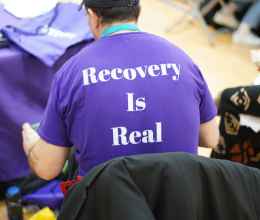
Judge denies motion to dismiss in ACLU lawsuit
A federal judge yesterday denied two individual officers’ motion to dismiss in a case brought by the ACLU of Massachusetts and Goodwin Procter LLP on behalf of the estate of Shayne Stilphen. As a result, the wrongful death lawsuit will now proceed against all defendants in the case, including the Boston Police Department (BPD) and a third individual officer who had previously filed answers in the case.
Shayne suffered an overdose in BPD custody in July 2019, which the complaint alleges was preventable. According to the complaint, BPD officers failed to provide Shayne with life-saving medical care until it was too late. Yesterday, Federal Judge Richard G. Stearns held that the complaint includes facts that “plausibly establish both subjective and objective reasons for the officers to understand that [Shayne] Stilphen faced substantial risk of serious harm unless provided immediate medical care.”
“Shayne was a beloved son, brother, and friend,” said Carol Rose, executive director of the ACLU of Massachusetts. “Nothing can repair the loss his family has experienced, but we are glad that this case may proceed, because police must be held accountable for the way they treat—or fail to treat—people in their custody.”
On July 14, 2019, Shayne was booked into BPD’s District 4 station near the intersection of Massachusetts Avenue and Melnea Cass Boulevard—the epicenter of the Commonwealth’s opioid crisis. The complaint alleges that videos from the booking area demonstrate that throughout the process, Shayne’s body contorted into unnatural postures, and he struggled to stay awake and could not stand on his own. According to the complaint, these signs of opioid over-intoxication should have caused the police officers to seek medical assistance for Shayne or provide him with medical care themselves; instead, they placed Shayne in a cell by himself.
Video surveillance footage from Shayne’s cell revealed that Shayne periodically ingested drugs for the next two hours and then slumped forward with his limp torso awkwardly folded over his crossed legs. Shayne remained motionless in this position of medical distress for almost an hour while officers walked by seven times. The complaint alleges that these officers had access to the overdose reversal medication, Narcan—which could have saved Shayne’s life—but did not use it. By the time an officer finally intervened to administer Narcan, it was too late. Notably, this officer responded the very first time he walked by Shayne’s cell and saw him in a position the officer described as looking “as if it would be of extreme discomfort for most individuals.” This was the same position every other officer had walked by without a response for nearly an hour.
“Shayne had a disease, and needed help,” said Lynnel Cox, mother of Shayne Stilphen. “Shayne was my only son, and I miss his warm spirit every day. Nothing has been the same since he has died. Everyone held in police custody is somebody’s child. Nobody deserves to die like Shayne did, and no family deserves to lose their loved one like we did. It gives me hope that this case can now continue to the next stage of litigation, because I do not want anyone else to experience this constant and unbearable pain.”
According to the complaint, Shayne left an indelible mark on the many people he positively impacted during his lifetime. Shayne was known for his quick wit, his artistic talents, his athleticism, and his love of cooking, and at the time of his death, he was talking to his mother about turning thirty, sharing plans with his mother about entering active recovery, becoming a barber, and having a child, the lawsuit alleges. Shayne’s compassion and advocacy, according to the complaint, inspired his mother Lynnel to establish Hand Delivered Hope – an organization that for many years provided direct outreach to people living with substance use disorder, and educated legislators, clergy, medical providers, law enforcement, and others how to understand, accept, include and care for people living with substance use disorders.
“The Court’s ruling is an important step in obtaining justice for the wrongful and tragic death of Shayne and for creating meaningful reform in how the Boston Police Department cares for those they bring into their custody,” said Alexandra Valenti, partner at Goodwin. “Shayne’s death did not need to happen, and we hope nothing like this will ever happen again.”
Filed on behalf of Shayne’s estate, the lawsuit names BPD and several individual officers as defendants. According to the complaint, the defendants denied Shayne his constitutional right to medical care and unlawfully discriminated against Shayne on the basis of his opioid use disorder (OUD) in violation of the Americans with Disabilities Act. These failures are especially egregious as less than two months before Shayne’s death, another man had died in District 4 under similar circumstances. Despite this, the complaint alleges, no officers were disciplined for that previous death and BPD implemented no new policies, protocols, or trainings that might have saved Shayne’s life. Each of these claims will now proceed to the next stage of litigation.
OUD is a chronic brain disease, according to the American Society of Addiction Medicine and other medical experts. Like other chronic illnesses, OUD often involves cycles of relapse and remission. Without treatment, patients with OUD are frequently unable to control their use of opioids, and the disease can lead to premature death, including due to accidental overdose. State data shows opioid overdose deaths in Massachusetts increased by 9 percent in 2021 compared to 2020, marking a record for the state and nearly 2,290 lives lost.
For more information about the case, go to: https://www.aclum.org/en/cases/stilphen-v-boston-police-department
For more information about the ACLU of Massachusetts, go to: http://www.aclum.org
For more information about Goodwin, go to: https://www.goodwinlaw.com







